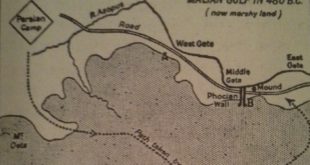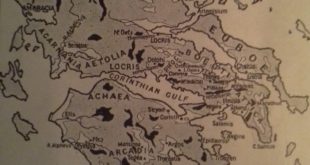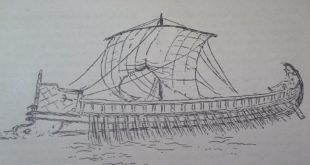After Thermopylae the Spartans were only interested in defending the Peloponnese. Their next line of defence was across the Isthmus of Corinth. The atmosphere on the two sides of that line was now very different. Much of the Peloponnese was still far from the war. At Olympia the four-yearly games were taking place as usual. (Who on earth was free to attend them? one wonders.) North of the Corinthian gulf, however, townsmen and countrymen alike knew that the Persian army would be on top of them any day now. Knowing this, what did they do? The men of Delphi routed …
Read More »Thermopylae
The first narrow place where the Persians might have been held was the pass of Tempe in the north of Thessaly. A force was sent there but withdrew when news came that the Persians might take another route and outflank them. Thessaly was thus abandoned to the Persians; but they were not to be allowed farther south without a fight. The only route lay through the pass of Thermopylae. Here Leonidas the Spartan, who was Commander-in-Chief of the Greek forces, decided to make a stand, while the combined Greek fleet kept watch near Artemisium on the Persian ships, which were …
Read More »The Second Persian Invasion
Darius I died in 486. In the last years of his life he had no need of the slave who had whispered. “Sire, remember the Athenians.” He remembered Marathon all too well and was making preparations for another attack on Greece. These preparations were continued after Darius’s death by his son Xerxes. By the year 480 an enormous force had assembled at Sardis and a fleet was ready to sail in support. This “Persian” army and fleet was in fact made up of contingents drawn from all over the vast Persian Empire, including Ionian Greeks. The march out of Sardis …
Read More »The Rivals
After a battle there is a great deal of clearing up to be done. A small part of the Athenian force had been left behind to do this. The general in command was Aristides. “The Just”. There was no fear of his taking any of the rich Persian spoil for himself. He had gained a reputation for scrupulous honesty, for putting country before self and for modest behaviour. These qualities were rare. Perhaps as he returned to the Athenians after completing his task at Marathon, he felt that he had a good chance of occupying a powerful position such as …
Read More »Contact with the West Brings Changes in Asia (the East)
In July 1858 a small fleet of American warships steamed into Tokyo Bay in Japan. The commander, Commodore Matthew C. Perry, had served during the War of 1812 and the war between the United States and Mexico (1846-1848). Perry’s voyage into Japanese waters did not mean that Japan and the United States were at war. Instead, Perry was bound on a peaceful mission, although it was expected that a show of force would help him to accomplish his purpose. For years American and European ship captains had tried to enter Japanese ports to trade and obtain supplies, but without success, …
Read More »Europe Annexes the African Continent
In 1871 there occurred one of the strangest meetings in history. The place was Ujiji on Lake Tanganyika in the heart of Africa. The men who met were David Livingstone, a Scottish missionary who was also a doctor, and Henry M. Stanley, a newspaperman. Livingstone had come to Africa about thirty years before. Anxious to spread Christianity and civilization among the Africans, in this unknown and mysterious continent, he had undertaken long trips into the interior. For several years, however, Livingstone had not been heard from, so the New York Herald sent Stanley, a roving reporter, to look for him. …
Read More »Progress in Ways of Living Continue Down the Centuries
It was the evening of December 17, 1903, when Bishop Wright in his home at Dayton, Ohio received the following telegram: SUCCESS. FOUR FLIGHTS THURSDAY MORNING ALL AGAINST TWENTY ONE MILE WIND. STARTED FROM LEVEL WITH ENGINE POWER ALONE. AVERAGE SPEED THROUGH AIR THIRTY-ONE MILES. LONGEST FLIGHT FIFTY NINE SECONDS. INFORM PRESS. HOME CHRISTMAS. ORVILLE WRIGHT This telegram tells simply and directly the story of the first successful motor-powered flights in an airplane. In these days, when planes make regularly scheduled flights across oceans and jet-powered planes exceed the speed of sound, we take air travel for granted. At the …
Read More »Industrial Revolution brings New Problems and Solutions
We remember how Rip Van Winkle, the famous character in Irving’s Sketch Book, fell asleep for 20 years. When poor old Rip stumbled back to his village, he was startled by the changes which he found. The people he talked with and the places he visited were strange. His former home was in ruins and his friends and nagging wife were dead. What was more, he discovered that a war had taken place and America was now an independent nation. If some imaginary native of Great Britain had returned to his home after slumbering from 1750 to 1850, he would …
Read More »The Growth of Science and Invention
“Repair this model, if you please.” These words were spoken to James Watt, an instrument maker at the University of Glasgow, Scotland, in 1764. The model showed how a steam engine worked, but what a steam engine! The original engine of which this miniature working model was a copy, was heavy and clumsy. Worse than that, it was extremely wasteful of the steam that ran it and therefore of the coal that was burned to generate the steam. Such steam engines, built by an English blacksmith named Newcomen, had been used for 40 years, but only in mines to pump …
Read More »Italy and Germany Become Unified nations
On May 11, 1860 an almost incredible military campaign began with the landing of Guiseppe Garibaldi on the western tip of Sicily. Garibaldi was a handsome, dashing, reckless warrior patriot. With him were a thousand devoted followers, clad in red shirts. Maybe red shirts were easier to shoot at than green or gray, but for every bullet, they attracted a recruit from the ranks of the enemy. The island of Sicily was one of the two parts of the Kingdom of the Two Sicilies. The other “Sicily” was the southern third of the peninsula of Italy. The capital of the …
Read More »








